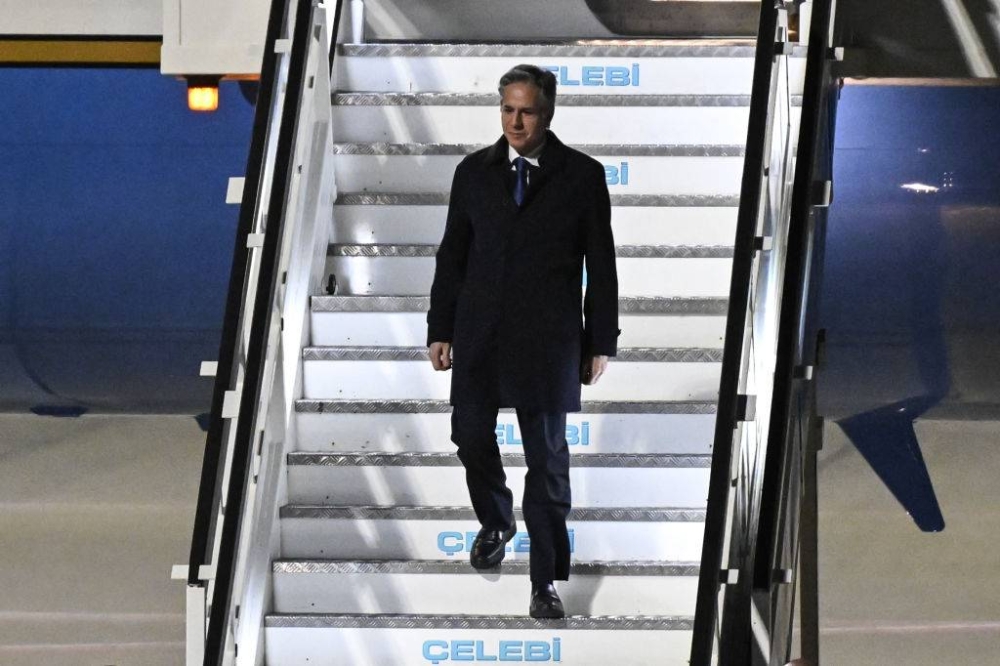Washington's top diplomat discussed the Israel-Gaza war with Turkey's mercurial leader on Saturday before flying to Crete to address Greek worries about the looming sale of US fighter jets to Ankara.
US Secretary of State Antony Blinken's high-stakes meeting with one of Washington's most unruly NATO allies came on the first leg of a trip that includes visits to both Israel and West Bank.
Blinken's fourth crisis tour since the start of the conflict three months ago comes with fears mounting that the conflict will engulf swathes of the Middle East.
A senior US administration official said Blinken would press Israel to increase aid to Palestinians and move to a phase of combat that allows the displaced to start returning to their homes.
The official added that much of the discussions with Arab leaders will focus on containing the violence and looking at how the region can be governed once the fighting ends.
Istanbul served as a base for Hamas political leaders until raids on Israel killed around 1,140 people and triggered a reprisal offensive that the Gaza health ministry says has claimed more than 22,700 lives -- most of them women and children.
Turkey asked the Hamas chiefs to leave after some were captured on video celebrating the deadliest attack in Israel's history.
- Strident critic -
Turkish President Recep Tayyip Erdogan has since turned into one of the Muslim world's harshest critics of the scale of death and destruction happening in Gaza -- and of Washington's support for Israel.
Erdogan has compared Israeli Prime Minister Benjamin Netanyahu to Adolf Hitler and accused the United States of sponsoring the "genocide" of Palestinians.
He has also rebuffed US pressure to cut off the suspected flow of funding through Turkey to Hamas and defended the group as legitimately elected "liberators" fighting for their land.
The US State Department on Friday announced $10 million in rewards for information about five alleged Hamas foreign operatives -- three of them believed to be based in Turkey -- thought to be helping finance the Iran-backed group.
Turkey this week countered by detaining 34 people suspected of planning attacks against Palestinians and spying for Israel's Mossad intelligence agency.
Erdogan began to tone down his most strident comments after US President Joe Biden last month called the Turkish leader for the first time since the war broke out.
The call helped push along NATO member Turkey's glacial progress in accepting Sweden into the US-led defence organisation in the wake of Russia's war on Ukraine.
A parliamentary committee approved Sweden's application in late December.
Some analysts believe Biden's call also secured Blinken's meeting with Erdogan. The Turkish leader notably left the capital during Blinken's last visit two months ago.
- Assurances -
Blinken's visit was played down by Turkish officials and few immediate details were disclosed.
Turkish state media released an official photo of Blinken shacking Erdogan's hand at one of the Turkish leader's Istanbul residences.
The Turkish foreign ministry issued a two line statement saying Blinken and counterpart Hakan Fidan discussed "the humanitarian crisis in Gaza, Sweden's NATO accession process, bilateral and regional issues".
Blinken will hope to win assurances that a ratification vote on Sweden's accession to NATO will be held soon by Turkey's parliament.
Erdogan has been able to use Turkey's veto power to impel Sweden into taking a tougher stance with Kurdish groups in Stockholm that Ankara views as "terrorists".
He has also been trying to make Sweden's approval conditional on the US delivering 40 US F-16 fighters jets and nearly 80 modernisation kits for Turkey's ageing air force.
Biden's administration officially backs the sale.
But has been unable to overcome resistance in Congress from lawmakers who express alarm about Turkey's position on Sweden and past military standoffs with historic rival Greece.
Blinken was to travel to the Greek island of Crete later Saturday for talks with Prime Minister Kyriakos Mitsotakis.
Athens has fiercely resisted the US jet sales because of longstanding territorial disputes with Turkey in the energy-rich eastern Mediterranean region.
Greece is seeking to purchase a batch of more advanced F-35 jets from the United States to counter the perceived Turkish threat.

